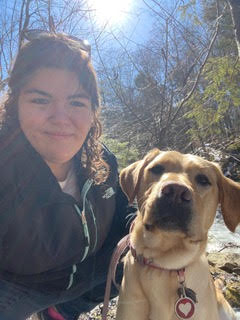Local Puppy Raiser Helps Provide Independence for the Visually Impaired
By Sophia Spiegel

Chances are Yorktown residents may have spotted Alissa Phillips walking around town training Molly, a 13-month-old yellow Lab.
What locals may not realize is that behind the endearing disposition and warm, brown eyes, Molly is much more than just a friendly playmate. She is the fifth puppy Phillips has raised to become a guide dog for the visually impaired.
Phillips has been volunteering as a puppy raiser since 2016 for Guiding Eyes for the Blind, a Yorktown Heights-based nonprofit organization that connects dogs with visually impaired people to help them achieve greater independence and freedom.
Operating out of its headquarters and training center on Granite Springs Road and Canine Development Center in Patterson in Putnam County, Guiding Eyes breeds, raises and trains puppies to aid those with vision loss. Guiding Eyes is an accredited member of the International Guide Dog Federation (IGDF), the organization that establishes worldwide standards for the breeding and training of guide dogs.
Growing up, Phillips always had a dog in her home, and would most certainly classify herself as “a dog person.” She volunteered as a kennel intern for Guiding Eyes as part of an internship program during her senior year of high school.
After graduating, Phillips wanted to continue volunteering for the organization, but needed an option that would fit into her busy college schedule. Phillips chose to become a puppy raiser after considering the plethora of opportunities Guiding Eyes offers volunteers.
After graduating from Iona College in 2019, Phillips was appointed Westchester region coordinator, a source of support for puppy raisers in the area as well as a resource for volunteers and aspiring applicants.
“Our puppy raisers are absolutely essential in nurturing our puppies for their willingness to learn, confidence, responsiveness and good manners necessary to become a guide dog,” said Andrea Martine, a guide dog mobility instructor at Guiding Eyes.
In her role, Phillips is assigned an eight-week-old puppy to bring into her home and teach basic obedience and house manners while socializing the pup to the outside world.
Guiding Eyes uses a relationship-based approach to raising and training puppies, using positive rewards to build a spirit of cooperation and willingness. The training comes naturally to Phillips, treating dogs with kindness and praise.
To integrate Molly into the world, Phillips feeds her treats while near traffic to calm her nerves and praises her after completing a task. According to Guiding Eyes, dogs raised through this program display significantly increased confidence and focus.
Guide dogs offer an alternative to the traditional white canes visually impaired people often use. Instead of sliding the cane back and forth to scan surroundings, guide dogs walk their owners around obstacles, giving them the opportunity to “walk with freedom and independence,” Phillips said.
The dogs also use what is called intelligent disobedience to determine when there is a possible hazard, such as an oncoming car when crossing the street, that a white cane is unable to detect.
Guiding Eyes holds monthly graduation ceremonies for dog guide teams that have completed their training. Here, members, supporters and volunteers gather to celebrate the accomplishment, and puppy raisers can meet their dog’s new handler. At one of the ceremonies, Phillips had the opportunity to meet the handler of a puppy she raised.
“It was such a rewarding feeling to meet them, share stories about the dog and see the end result,” she said.
Training programs for Guiding Eyes haven’t gone untouched by COVID-19. Prior to the pandemic, in-person classes would be held at the training school in Yorktown, but due to social distancing guidelines and other restrictions, Guiding Eyes had to adapt to virtual sessions using Google Meet, and socializing the dogs became a far more difficult task.
“One of the things that I would seek out as a puppy raiser before COVID was big groups of people or very busy grocery stores, but that’s something I am personally looking to avoid because of the pandemic,” Phillips shared.
Recently, Guiding Eyes started hosting puppy classes in person again, but with modifications to ensure the safety of their volunteers and dogs. Classes are held outside, participants are spaced 12 feet apart and masks are required. While puppy raisers used to share equipment and interact with other dogs and volunteers, classes are now limited to group activities with physical separation.
Due to the challenges caused by the pandemic, puppies may take longer to graduate, but the volunteers at Guiding Eyes have shown resilience to the community they serve. It takes up to three years and costs about $50,000 to breed, raise and train a guide dog.
Once Molly completes her training, she will be paired with a visually impaired person at no cost to the recipient.
Phillips encourages anyone fond of dogs to explore the possibility of puppy raising.
“I think it is a great way for people to learn and grow as well as have a positive experience with dogs and with their community,” she said.
Puppy raisers can come from any walk of life as long as they can fit the training program into their lifestyle.
For more information on Guiding Eyes for the Blind, including how to volunteer or donate to the organization, visit https://www.guidingeyes.org.

Examiner Media – Keeping you informed with professionally-reported local news, features, and sports coverage.
